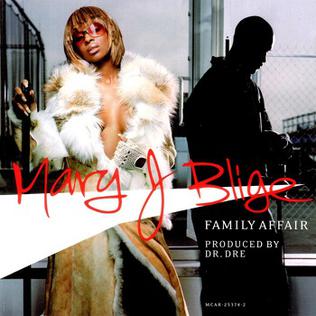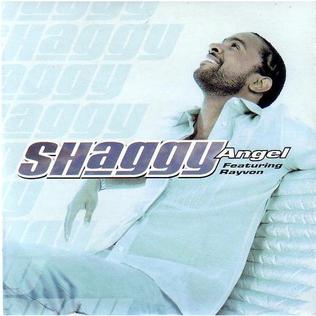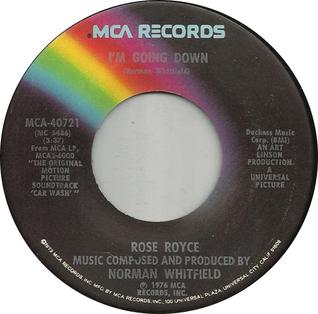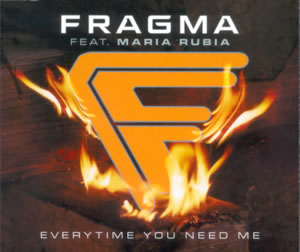
"Family Affair" is a song by American singer Mary J. Blige. It was written by Blige, her brother Bruce Miller, Camara Kambon, Michael Elizondo, and producer Dr. Dre for her fifth studio album, No More Drama (2001).

"Angel" is a song by Jamaican reggae artist Shaggy featuring additional vocals from Barbadian singer Rayvon. Sampling the 1973 song "The Joker" by American rock band Steve Miller Band and interpolating the 1967 song "Angel of the Morning" written by Chip Taylor, it was released to radio on 9 January 2001 as the follow-up to Shaggy's international number-one hit, "It Wasn't Me". "Angel" also proved to be successful, reaching number one in 12 countries, including Australia, Germany, Ireland, the United Kingdom, and the United States.

"It Wasn't Me" is the first single from Jamaican-American reggae musician Shaggy's fifth studio album, Hot Shot (2000). The song features vocals from RikRok. The lyrics of the song depict one man asking his friend what to do after his girlfriend caught him cheating on her with "the girl next door". His friend/Shaggy's character's advice is to deny everything, despite clear evidence to the contrary, with the phrase "It wasn't me."

"No More Drama" is a song by American recording artist Mary J. Blige, taken from her fifth studio album of the same name (2001). It was released as the album's second single in the United States on October 30, 2001, and as the third single in certain European markets, where "Dance for Me" served as the second single instead. The Jimmy Jam and Terry Lewis-produced track became another hit for Blige, peaking at number 15 on the US Billboard Hot 100 and number nine in the United Kingdom.

American singer Mary J. Blige began her career as a backing vocalist for Uptown Records in the early 1990s. In a career spanning more than thirty years, she has released 14 studio albums and 83 singles—including more than 20 as a featured artist. The "Queen of Hip-Hop Soul" has sold an estimate of over 100 million records worldwide, and over 20 million in the United States alone. Billboard ranked Blige as the 18th Greatest Billboard 200 Woman of all time, the 45th Greatest Hot 100 Woman of all time and 88th Greatest Artist of all time.

"Lady (Hear Me Tonight)" is a song by French house duo Modjo, written and performed by vocalist Yann Destagnol and producer Romain Tranchart. It was released on 19 June 2000 as the lead single from the duo's self-titled debut studio album (2001). It became a major worldwide success, topping at least 10 music charts, including the national charts of Ireland, Italy, Spain, Switzerland, and the United Kingdom. It also topped the US Billboard Hot Dance Club Play chart in January 2001.

"Real Love" is a song by American singer Mary J. Blige from her debut studio album, What's the 411? (1992). Based on real life experiences, it was written and produced by Cory Rooney and Mark Morales, and samples Audio Two's 1987 song "Top Billin'". The song was issued as the album's second single on July 28, 1992 by Uptown and MCA. It became Blige's first top-10 hit, peaking at number seven on the US Billboard Hot 100. It also topped the Billboard Hot R&B/Hip-Hop Songs and Rhythmic charts and was certified Gold by the Recording Industry Association of America (RIAA) on November 4, 1992. Marcus Raboy directed the song's music video. Rolling Stone included "Real Love" in their list of "500 Best Songs of All Time" in 2021 at number 327.

"You Remind Me" is a song by American singer-songwriter Mary J. Blige. It served as Blige's first single from her debut album, What's the 411? (1992). Written by Eric Milteer and produced by Dave "Jam" Hall, it was originally used on the soundtrack of 1991 comedy film Strictly Business. The song marked Blige's first top forty hit, reaching number twenty-nine on the Billboard Hot 100 and number one on the Hot R&B Singles chart. The music video was released in 1992. The song also sampled Patrice Rushen’s 1982 song, ‘Remind Me’.

"911" is a duet between Haitian rapper Wyclef Jean and American soul music singer Mary J. Blige. It was released on 5 September 2000 as the third single from Jean's second studio album, The Ecleftic: 2 Sides II a Book (2000), and was later included on Blige's compilation Reflections (2006). The song peaked at number 38 on the US Billboard Hot 100 and had success worldwide, particularly in Scandinavian countries, reaching number one in Norway and Sweden.

"Touch Me" is a song by Portuguese house music producer Rui da Silva and British singer-songwriter Cassandra Fox. The song began to gain popularity after being played in dance clubs in October 2000. The track was originally scheduled for release in December 2000, but it was postponed to avoid competing with songs that would experience sales surges resulting from the Christmas holiday period. It was eventually released on 1 January 2001.

"Straight Up" is a single by American singer-songwriter Chanté Moore, released in August 2000. It was written by R&B singer Lil' Mo and produced by Jermaine Dupri. The song served as the lead single for Chanté Moore's fourth album, Exposed (2000). "Straight Up" reached number 83 on the US Billboard Hot 100, number 22 on the Billboard Hot R&B/Hip-Hop Singles & Tracks, and number 11 on the UK Singles Chart. A music video directed by Bille Woodruff was created for the song.

"As" is a song written and performed by American singer and musician Stevie Wonder from his eighteenth album, Songs in the Key of Life (1976). The song was released in October 1977 by Tamla and reached number 36 on both the US Billboard Hot 100 and Black Singles chart. It gets its name from the first word of its lyrics.

"You Don't Have to Worry" is a song by American R&B singer Mary J. Blige. It was written by Kenny Greene and Edward "DJ Eddie F" Ferrell for the soundtrack of the film Who's the Man? (1993), while production was helmed by Ferrell, with co-production from Kenny "K-Smoove" Kornegay and Darin "Piano Man" Whittington. It contains a sample of "Papa Don't Take No Mess" by James Brown. Released as a single, it charted on the US Billboard Hot 100, peaking at number 63, while reaching number 11 on the Billboard Hot R&B/Hip-Hop Songs. A remix version featuring rapper Craig Mack was produced by Sean "Puffy" Combs and Tony Dofat and later included on Blige's remix album, What's the 411? Remix (1993).

"Everything" is a song by American singer Mary J. Blige. It was written and produced by Jimmy Jam & Terry Lewis for Blige's third album, Share My World (1997). The song contains samples from "You Are Everything" (1971) by American soul group The Stylistics and "The Payback" (1973) by American singer James Brown, also incorporating elements from "Sukiyaki" (1961) by Japanese singer Kyu Sakamoto. Due to the inclusion of the samples, Brown, Hachidai Nakamura, Rokusuke Ei, Linda Creed, Thom Bell, John Starks, and Fred Wesley are also credited as songwriters.

"Be Happy" is a song by American singer Mary J. Blige. It was written by Blige, Sean "Puffy" Combs, Arlene DeValle, and Jean-Claude Olivier from duo Poke & Tone for her second studio album, My Life (1994), while production was helmed by Combs and Olivier. "Be Happy" contains an instrumental sample of the song "You're So Good to Me" (1979) by musician Curtis Mayfield and a re-sung vocal portion of the record "I Want You" (1976) by Marvin Gaye.

"I'm Going Down" is a song written and produced by Norman Whitfield, and performed by American soul and R&B group Rose Royce in 1976. It is from the film Car Wash and is featured on its soundtrack. In 1994, it was covered by American singer Mary J. Blige.

"Love No Limit" is a song by American recording artist Mary J. Blige. It was co-written by Kenny Greene and Dave "Jam" Hall for her debut album, What's the 411? (1992), while production was overseen by Hall. Released as the album's fourth and final single, the song became a top five hit, reaching number-five on the US R&B singles chart, and peaked at number forty-four on the US Billboard Hot 100 chart. Hall has stated in interviews, that he wanted to give the song an urban, hip-hop feel to a much more jazzy sound, when it was created.

"My Love" is a song by American R&B singer Mary J. Blige from her debut album, What's the 411? (1992). The song, released by Uptown and MCA, was co-written by singer-songwriter Kenny Greene and Dave Hall, who served as the song's original producer. It peaked at number 23 on the US Billboard Hot R&B/Hip-Hop Songs chart and at number 29 on the UK Singles Chart in 1994, becoming Blige's second single to reach the top 40 in the United Kingdom.

"Reminisce" is a song by American singer Mary J. Blige from her debut album, What's the 411? (1992). It was co-written by Kenny Greene and Dave "Jam" Hall, who also produced it. Described as a new jack swing song inspired by 1970s soul music, it contains a sample of "Stop, Look, Listen" (1989) by American rapper MC Lyte. The single peaked at number fifty-seven on the Billboard Hot 100 and number six on the Hot R&B/Hip-Hop Songs chart. A more uptempo and hip hop-inspired remix of the song, featuring duo Pete Rock & CL Smooth, later appeared on Blige's 1993 remix album of the same name.

"Everytime You Need Me" is a song by German trance group Fragma featuring English singer Maria Rubia. It was released in January 2001 as the third single from their debut album, Toca (2001). The single peaked at number three on the UK Singles Chart and in Finland while also becoming a top-10 hit in Ireland and Norway.



















